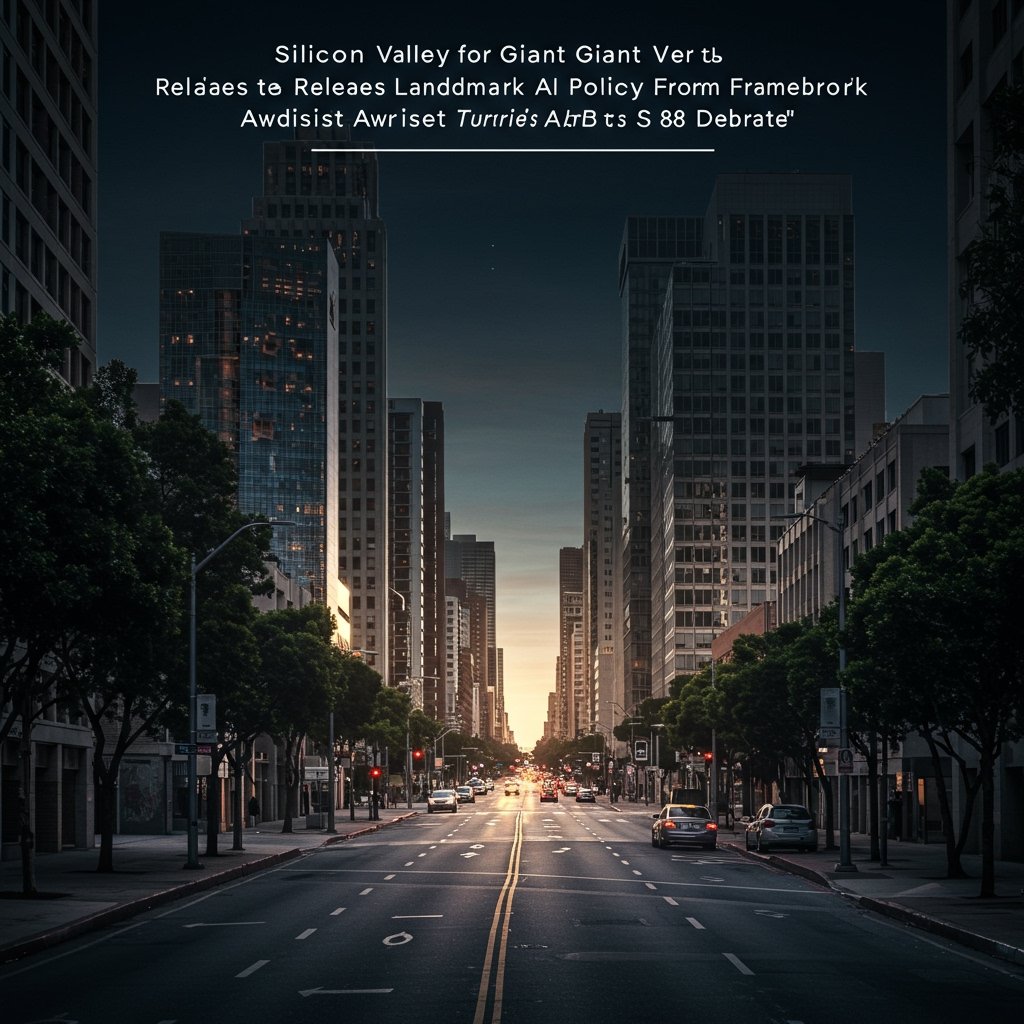Silicon Valley Giant Veridia Releases Landmark AI Policy Framework Amidst SB 88 Debate
(Date) Silicon Valley, CA – On February 10, 2025, Veridia Corp., a prominent software industry leader headquartered in Silicon Valley, publicly unveiled its comprehensive internal policy framework designed to guide the ethical development and responsible deployment of artificial intelligence technologies. This significant release occurs as California lawmakers continue deliberation on pivotal AI safety and governance legislation.
The Comprehensive Veridia AI Policy Framework
The newly released document, a substantial 30-page outline, meticulously details Veridia’s principles and procedures for managing AI across its operations. Available for public review on the company’s official website, the framework addresses critical areas that are at the forefront of global discussions concerning AI ethics and regulation. Key pillars of the policy include stringent guidelines on data privacy, robust methodologies for bias mitigation within AI systems, and commitments to enhancing transparency in how AI operates and makes decisions.
Veridia states that the framework represents a significant investment in ensuring its AI technologies are developed and utilized in a manner that fosters trust, ensures fairness, and upholds individual rights. The data privacy section reportedly outlines protocols for data collection, storage, and usage, emphasizing consent and minimization principles in line with evolving global regulations. The bias mitigation guidelines detail processes for identifying, evaluating, and reducing algorithmic bias throughout the AI lifecycle, from data preparation to model deployment and monitoring. Furthermore, the transparency commitments reportedly focus on explainability, aiming to provide clarity on AI system behaviors and outcomes where feasible and necessary.
Proactive Strategy Ahead of Anticipated State Legislation
The timing of Veridia’s announcement is particularly noteworthy. The company has explicitly positioned the public release of its framework as a proactive measure designed to address potential concerns and requirements anticipated in California’s pending legislation, specifically Senate Bill 88 (SB 88). This bill, focused on AI safety and governance, is currently making its way through the California state legislature and is widely expected to reach a floor vote by late spring 2025.
Veridia representatives indicated that the company has been developing this internal framework for some time, recognizing the increasing importance of establishing clear ethical guardrails for AI. However, the decision to make it public now underscores the urgency felt by major tech firms in anticipating and potentially influencing forthcoming regulatory landscapes. The state of California, as a global hub for technology and innovation, is often seen as a bellwether for future national and international regulatory trends, making SB 88 a bill of significant interest across the industry.
Leadership Perspective from Veridia’s CEO
Mark Chen, CEO of Veridia Corp., provided insights into the strategic thinking behind the framework and its public release. In a statement accompanying the announcement, Chen emphasized the company’s commitment to responsible innovation.
“We believe that establishing clear, ethical guidelines for AI development and deployment is not just a regulatory necessity, but a fundamental responsibility for companies operating at the forefront of this transformative technology,” Chen stated. “Our comprehensive framework is the result of extensive internal collaboration and reflects our deep commitment to building AI systems that are safe, fair, and transparent.”
Chen further elaborated on the connection to the legislative environment. “We recognize the important work being done by California legislators to address the potential societal impacts of AI,” he continued. “Our framework is specifically designed to proactively address the very concerns we anticipate will be central to discussions surrounding Senate Bill 88. We hope that by sharing our internal standards and practices, we can contribute constructively to the ongoing dialogue about effective AI governance.”
Engaging with Policymakers and Proposing Industry Standards
Beyond simply publishing the framework online, Veridia has indicated a clear intention to actively engage with state legislators in California. Company representatives stated they plan to lobby policymakers in Sacramento, using their newly unveiled 30-page document as a concrete example and a potential model for industry best practices.
This lobbying effort signifies a strategic move by Veridia to help shape the impending legislation rather than merely react to it. By presenting their internal framework, Veridia aims to demonstrate that robust AI governance is achievable and that industry-developed standards can potentially serve as a foundation or complement to legislative mandates. The company hopes its detailed guidelines on areas like data privacy, bias mitigation, and transparency will resonate with legislators seeking practical and effective ways to regulate AI without stifling innovation. Veridia representatives will likely highlight how the framework’s principles align with the stated goals of SB 88 while also being implementable within a complex technology development environment.
Broader Implications for AI Governance
Veridia’s public release and lobbying strategy hold broader implications for the tech industry and the future of AI governance. As governments globally grapple with how to regulate AI, voluntary frameworks developed by leading companies could either pave the way for sensible legislation or be seen as attempts to preempt potentially stricter rules.
The move positions Veridia as a potential leader in advocating for specific approaches to AI regulation. If elements of their framework are adopted or influence SB 88, it could set a precedent for how other states or even the federal government approach AI policy. It also puts pressure on other major tech firms to publicly articulate their own internal AI governance standards. The discussion around SB 88 in California is expected to be intense, involving various stakeholders from industry, civil society, academia, and government. Veridia’s framework adds a specific, detailed proposal from a major player into this complex mix.
The success of Veridia’s lobbying efforts and the extent to which their framework influences SB 88 remain to be seen. However, the public availability of the document allows for external scrutiny and provides a tangible starting point for discussions about industry accountability. This step marks a pivotal moment where a major tech company is attempting to get ahead of regulation by proposing its own operational blueprint as a potential standard.
Conclusion
The unveiling of Veridia Corp.’s comprehensive internal AI policy framework on February 10, 2025, represents a significant development in the ongoing conversation about the responsible development and deployment of artificial intelligence. By publicly detailing its guidelines on data privacy, bias mitigation, and transparency, and explicitly linking this effort to California’s pending Senate Bill 88, Veridia is taking a proactive stance. The company’s stated intention to use this framework to lobby state legislators positions it as an active participant in shaping future AI governance. As California moves towards a potential floor vote on SB 88 by late spring 2025, Veridia’s initiative provides a concrete example of how one major tech firm believes ethical AI principles can be translated into practice, offering a potential model for both industry and regulators navigating the complex landscape of AI safety and governance.



















